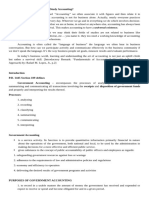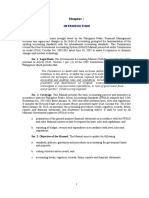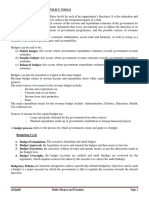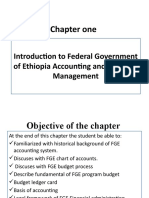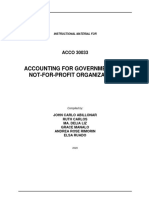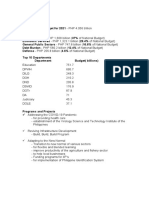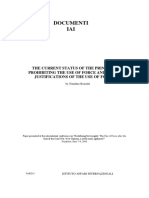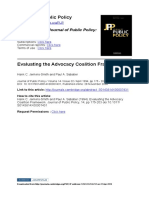Ae119 1
Ae119 1
Uploaded by
alliahnahCopyright:
Available Formats
Ae119 1
Ae119 1
Uploaded by
alliahnahOriginal Title
Copyright
Available Formats
Share this document
Did you find this document useful?
Is this content inappropriate?
Copyright:
Available Formats
Ae119 1
Ae119 1
Uploaded by
alliahnahCopyright:
Available Formats
INTRODUCTION
Government is the political system by which a country or community is administered and
regulated. Government is necessary to the existence of civilized society.
Functions of the Government
• Maintain law and order
• Protection of the environment
• Regulate labor markets
• National defense
• Macro-economic stability
• Reduce market failure
• Minimize inequality
• Provide public goods
• Raise taxes
Transparency and Accountability
Fiscal policy refers to the "measures employed by governments to stabilize the economy,
specifically by manipulating the levels and allocations of taxes and government expenditures.
Declared policy of the State that all resources of the government shall be managed, expended
or utilized in accordance with laws and regulations, and safeguarded against loss or wastage
through illegal or improper disposition, with a view to ensuring efficiency, economy and
effectiveness in the operations of government. The responsibility to take care that such policy is
faithfully adhered to rests directly with the chief or head of the government agency concerned.
(Sec. 2, P.D. No. 1445)
Government Budget is the financial plan of a government for a given period, usually for a fiscal
year, which shows what its resources are, and how they will be generated and used over the
fiscal period. The budget is the government's key instrument for promoting its socio-economic
objectives. The government budget also refers to the income, expenditures and sources of
borrowings of the National Government (NG) that are used to achieve national objectives,
strategies and programs.
Government Accounting encompasses the processes of analyzing, recording, classifying,
summarizing and communicating all transactions involving the receipt and disposition of
government funds and property, and interpreting the results thereof. (Sec. 109, Presidential
Decree (P.D.) No. 1445)
GOVERMENT BUDGET
Revenue:
Taxes
Grants
PAGCOR
+ Loans
= Expenses/Capital Expenditures
PHILIPPINE GOVERNMENT ACCOUNTING SYSTEM
OGAS, Old Government System – as of 2001 has been in used for about five decades
NGAS, New Government System – replaced the OGAS in 2002
GAM, Government Accounting Manual – replaced the NGAS on January 1, 2016
The Government Accounting Manual is the manual prescribed by the Commission on
Audit (COA) for use of all National Government Agencies.
Recent developments brought about by the Philippine Public Financial Management Reforms
and significant changes in the field of accounting prompted the harmonization of the existing
accounting standards with the international accounting standards.
GAM presents the basic accounting policies and principles in accordance with the Philippine
Public Sector Accounting Standards (PPSAS) adopted thru COA Resolution No. 2014-003
dated January 24, 2014
GAM shall be used by all National Government Agencies (NGAs) in the:
a) preparation of the general-purpose financial statements in accordance with the PPSAS
and other financial reports as may be required by laws, rules and regulations; and
b) reporting of budget, revenue and expenditure in accordance with laws, rules and
regulations.
Objective of the Manual (GAM)
The Manual aims to update the following:
a) standards, policies, guidelines and procedures in accounting for government funds and
property;
b) coding structure and accounts;
c) accounting books, registries, records, forms, reports and financial statements
INTERNATIONAL PUBLIC SECTOR ACCOUNTING STANDARDS
• The GAM for NGAs was promulgated primarily to harmonize the Philippine
government accounting standards with the International Public Sector Accounting
Standards (IPSAS).
• The Philippine Government has adopted the IPSAS throu gh the Philippine Public
Sector Accounting Standards (PPSAS).
• The provisions of the PPSAS are incorporated in GAM for NGAs
Financial Reporting System for the National Government
The financial reporting system of the Philippine government consists of accounting system on
accrual basis and budget reporting system on budget basis under the statutory responsibility of
the NGAs, Bureau of the Treasury (BTr), Department of Budget and Management (DBM), and
the COA, as follows:
a. Each entity of the National Government (NG) maintains complete set of accounting books by
fund cluster which is reconciled with the records of cash transactions maintained by the BTr.
b. The BTr accounts for the cash, public debt and related transactions of the NG.
c. Each entity maintains budget registries which are reconciled with the budget records
maintained by the DBM and the Government Accountancy Sector (GAS), COA.
d. The COA, through the GAS:
1. maintains budget records showing the overall approved budget of the NG and its
execution/implementation;
2. consolidates the FS sand budget accountability reports of all NGAs and the BTr with
COA's records to come up with an Annual Financial Report (AFR) for the NG as required in
Section 4, Article IX-D of the 1987 Philippine Constitution; and
3. prepares other financial reports required by law for submission to oversight agencies.
MAJOR PARTICIPANTS IN THE GOV'T FISCAL SYSTEM
DEPARTMENT OF BUDGET AND MANAGEMENT (DBM)
• The Department of Budget and Management, created under Executive Order No. 21
dated April 25, 1936, is mandated under this Order and by subsequent issuances to
promote the sound, efficient and effective management and utilization of government
resources (i.e., technological, manpower, physical and financial) as instrument in the
achievement of national socioeconomic and political development goals.
• BUREAU OF TREASURY manages the cash resources, collect taxes made by the
National Government (NG) and guarantee forward cover fees due NG, control and
service its public debt, both foreign or domestic
• COMMISSION ON AUDIT (COA) an indepndent Constitutional commission which
has primary function to examine, audit and settle accounts and expenditures of the
funds and properties of the Philippine Goventment.
IMPLEMENTING AGENCIES/DEPARTMENTS
• Implementation of the government projects and performing designated governmental
functions.
• Each is required by law to have accounting unit/division/department.
BUDGET AND FINANCIAL REPORTING SYSTEM
Department
A B C D
Budget Registries =GAA
Book of Accounts
Financial Statements =AFR
You might also like
- Pa 111 Public Accounting and Budgeting Module IDocument23 pagesPa 111 Public Accounting and Budgeting Module IAbdul Hakim Mambuay100% (10)
- Sample Motion For Reconsideration For California DivorceDocument3 pagesSample Motion For Reconsideration For California DivorceStan Burman50% (2)
- Teixeira ComplaintDocument11 pagesTeixeira ComplaintCBS News PoliticsNo ratings yet
- 001 Government AccountingDocument75 pages001 Government AccountingMark Brian Parantar100% (1)
- Chapter 1 - Intro To Engineering Profession and Computer Engineering-1Document50 pagesChapter 1 - Intro To Engineering Profession and Computer Engineering-1alliahnah50% (2)
- Chapter 1Document68 pagesChapter 1Merrill Ojeda SaflorNo ratings yet
- Government AccountingDocument32 pagesGovernment AccountingLaika Mae D. CariñoNo ratings yet
- Government AccountingDocument4 pagesGovernment AccountingSarha LadjatuaNo ratings yet
- Accounting ReviewerDocument22 pagesAccounting ReviewerAira TantoyNo ratings yet
- On Audit:: Government Accounting Manual (Gam) PointersDocument9 pagesOn Audit:: Government Accounting Manual (Gam) PointersPepsi ColaNo ratings yet
- Chapter 1 Nature and Scope of NGASDocument26 pagesChapter 1 Nature and Scope of NGASRia BagoNo ratings yet
- Module 1. General Provisions, Basic Standards and PoliciesDocument12 pagesModule 1. General Provisions, Basic Standards and PoliciesMa. Leslyn NummilaNo ratings yet
- Government AccountingDocument106 pagesGovernment AccountingTwinie Mendoza100% (2)
- AFAR-21 (Government Accounting)Document19 pagesAFAR-21 (Government Accounting)Friedeagle OilNo ratings yet
- Fundamental Principles For Government Accounting and Budget ReportingDocument3 pagesFundamental Principles For Government Accounting and Budget ReportingKarl Benzent SibayanNo ratings yet
- Chapter 1 - Overview of Government AcctgDocument21 pagesChapter 1 - Overview of Government AcctgKeight NuevaNo ratings yet
- ChapterDocument17 pagesChapterQuennie DesullanNo ratings yet
- Acc 312 MidtermsDocument79 pagesAcc 312 MidtermsAlthea mary kate MorenoNo ratings yet
- Goverment AccountingDocument10 pagesGoverment Accountingkhrysna ayra villanuevaNo ratings yet
- I. General Provisions Basic Standards and PoliciesDocument19 pagesI. General Provisions Basic Standards and Policiesedelmay CariateNo ratings yet
- Basic Concepts of Government Accounting (Part 2)Document2 pagesBasic Concepts of Government Accounting (Part 2)Lode FrustrataNo ratings yet
- HO-1 - Introduction To Govt. AccountingDocument7 pagesHO-1 - Introduction To Govt. AccountingSmashed PotatoNo ratings yet
- Government AccountingDocument7 pagesGovernment AccountingErica EgidaNo ratings yet
- Note 1 - MEC 34Document7 pagesNote 1 - MEC 34S GracsNo ratings yet
- XADVACT3 (PPT) MODULE 05 - GOVERNMENT ACCOUNTING (Part 1) - 11.06.2023 v1Document29 pagesXADVACT3 (PPT) MODULE 05 - GOVERNMENT ACCOUNTING (Part 1) - 11.06.2023 v1diabetic1790No ratings yet
- Gov Acc 2019 JaaDocument9 pagesGov Acc 2019 JaaGlaiza Lerio100% (1)
- Commission On Audit:: Government Accounting Manual (Gam) Pointers CA51027Document4 pagesCommission On Audit:: Government Accounting Manual (Gam) Pointers CA51027Carl Dhaniel Garcia SalenNo ratings yet
- LG Accounting ReportDocument8 pagesLG Accounting Reportolivarmichelle81No ratings yet
- Module 1: Introduction To Government Accounting and The Philippine Budget ProcessDocument20 pagesModule 1: Introduction To Government Accounting and The Philippine Budget ProcessLaong laan100% (1)
- Pre-1. Introduction To Government AccountingDocument24 pagesPre-1. Introduction To Government AccountingPaupauNo ratings yet
- Government Accounting ReportDocument48 pagesGovernment Accounting ReportReina Regina S. CamusNo ratings yet
- Government Accounting System Ref 2Document15 pagesGovernment Accounting System Ref 2Romeo AnacanNo ratings yet
- Sec. 1. Legal Basis. The Government Accounting Manual (GAM) Is Prescribed by COADocument3 pagesSec. 1. Legal Basis. The Government Accounting Manual (GAM) Is Prescribed by COAElla Mae TuratoNo ratings yet
- 5 - Notes On Government AccountingDocument3 pages5 - Notes On Government AccountingLabLab Chatto0% (1)
- Budgetary and Fiscal Policy Tools PDFDocument5 pagesBudgetary and Fiscal Policy Tools PDFAshagre MekuriaNo ratings yet
- GovAcc HO No. 2 - The Philippine Budget CycleDocument9 pagesGovAcc HO No. 2 - The Philippine Budget Cyclebobo kaNo ratings yet
- Overview of Govt AccountingDocument15 pagesOverview of Govt Accountingleyn sanburgNo ratings yet
- 01 HandoutDocument8 pages01 Handoutpaulinesarte0No ratings yet
- AFAR-20 (Government Accounting)Document18 pagesAFAR-20 (Government Accounting)Ide VelcoNo ratings yet
- Government Accounting: Accounting For Non-Profit OrganizationsDocument88 pagesGovernment Accounting: Accounting For Non-Profit OrganizationsDe GuzmanNo ratings yet
- Introduction To Government AccountingDocument34 pagesIntroduction To Government AccountingAnnamae Teoxon100% (1)
- Non Gov ReviewerDocument426 pagesNon Gov ReviewerMA. CHRISTINA BUSAINGNo ratings yet
- Fiscal AdministrationDocument48 pagesFiscal AdministrationMaiko Gil Hiwatig100% (1)
- CH 1Document18 pagesCH 1olfuvalexecutivesec.nfjpia2324No ratings yet
- Chapter One: Introduction To Federal Government of Ethiopia Accounting and Financial ManagementDocument61 pagesChapter One: Introduction To Federal Government of Ethiopia Accounting and Financial ManagementGirma100% (4)
- Module For Public Accounting and BudgetingDocument113 pagesModule For Public Accounting and BudgetingLlyr Bryant100% (1)
- Accounting For Government and Not-For-Profit Organizations: ACCO 30033Document13 pagesAccounting For Government and Not-For-Profit Organizations: ACCO 30033Angelito Mamersonal100% (1)
- Government BudgetDocument5 pagesGovernment BudgetErjohn PapaNo ratings yet
- Gov Acc 2019 JC AbillonarDocument9 pagesGov Acc 2019 JC AbillonarGabriel PonceNo ratings yet
- Government Accounting - Defined: Lecture Aid Nature and Scope of NGASDocument2 pagesGovernment Accounting - Defined: Lecture Aid Nature and Scope of NGASrnNo ratings yet
- Overview of Government AccountingDocument2 pagesOverview of Government Accountingwhin LimboNo ratings yet
- Budget ProcessDocument1 pageBudget ProcessIm NayeonNo ratings yet
- Government Accounting Overview of Government AccountingDocument77 pagesGovernment Accounting Overview of Government AccountingMichael Brian Torres100% (1)
- Chapter 1 - New Government Accounting System (Ngas)Document28 pagesChapter 1 - New Government Accounting System (Ngas)MA ValdezNo ratings yet
- Government Accounting - General FundDocument47 pagesGovernment Accounting - General FundAllen GonzagaNo ratings yet
- Performance Management & HRMDocument67 pagesPerformance Management & HRMPrecy CoNo ratings yet
- Module 1Document10 pagesModule 1Cassandra VenecarioNo ratings yet
- Government Accounting Ch1Document31 pagesGovernment Accounting Ch1John Evan Raymund Besid100% (1)
- CHAPTER 2..ritchelle DelgadoDocument40 pagesCHAPTER 2..ritchelle DelgadonicahNo ratings yet
- Basic Concepts of Government AccountingDocument10 pagesBasic Concepts of Government AccountingLyra EscosioNo ratings yet
- TOPIC 1 Fiscal PolicyDocument5 pagesTOPIC 1 Fiscal PolicyMaybelyn Dumaquita RamosNo ratings yet
- "The Language of Business: How Accounting Tells Your Story" "A Comprehensive Guide to Understanding, Interpreting, and Leveraging Financial Statements for Personal and Professional Success"From Everand"The Language of Business: How Accounting Tells Your Story" "A Comprehensive Guide to Understanding, Interpreting, and Leveraging Financial Statements for Personal and Professional Success"No ratings yet
- Ma 103 2Document5 pagesMa 103 2alliahnahNo ratings yet
- Lesson 4a. Officer-Violator RelationshipDocument3 pagesLesson 4a. Officer-Violator RelationshipalliahnahNo ratings yet
- CDI 2C MODULE-Lesson 1Document4 pagesCDI 2C MODULE-Lesson 1alliahnahNo ratings yet
- Valuation Method 1Document7 pagesValuation Method 1alliahnahNo ratings yet
- Topic 7. Salient Provisions of R.A. 4136Document6 pagesTopic 7. Salient Provisions of R.A. 4136alliahnahNo ratings yet
- The Influence of Intention Utilization and Use ofDocument17 pagesThe Influence of Intention Utilization and Use ofalliahnahNo ratings yet
- Free Cash Flow (Solution)Document11 pagesFree Cash Flow (Solution)alliahnahNo ratings yet
- 10.2.3.2 Capital Budgeting ComputationDocument3 pages10.2.3.2 Capital Budgeting ComputationalliahnahNo ratings yet
- UC MODULE TECHNO 100 - Unit 2 Topic 1 PDFDocument8 pagesUC MODULE TECHNO 100 - Unit 2 Topic 1 PDFalliahnahNo ratings yet
- UC MODULE TECHNO 100 - Unit 3 PDFDocument7 pagesUC MODULE TECHNO 100 - Unit 3 PDFalliahnahNo ratings yet
- VMobile Feasibility Study Student WorkDocument29 pagesVMobile Feasibility Study Student WorkalliahnahNo ratings yet
- Ae119 AbDocument2 pagesAe119 AballiahnahNo ratings yet
- Fundamental Principles For Revenue Collections and ReceiptsDocument3 pagesFundamental Principles For Revenue Collections and ReceiptsalliahnahNo ratings yet
- VM 1Document2 pagesVM 1alliahnahNo ratings yet
- Absorption and Variable CostingDocument13 pagesAbsorption and Variable CostingalliahnahNo ratings yet
- Cornerstones: of Managerial Accounting, 6eDocument74 pagesCornerstones: of Managerial Accounting, 6ealliahnahNo ratings yet
- Impact of Accounting Software Among Smes Accountants in OmanDocument10 pagesImpact of Accounting Software Among Smes Accountants in OmanalliahnahNo ratings yet
- Ae119 2Document3 pagesAe119 2alliahnah100% (1)
- Segment Reporting Decentralized Operations and Responsibility Accounting SystemDocument34 pagesSegment Reporting Decentralized Operations and Responsibility Accounting SystemalliahnahNo ratings yet
- The Influence of Intention Utilization and Use ofDocument17 pagesThe Influence of Intention Utilization and Use ofalliahnahNo ratings yet
- Financial Management Practices and Profitability of Business Enterprises in Obuasi Municipality, GhanaDocument12 pagesFinancial Management Practices and Profitability of Business Enterprises in Obuasi Municipality, GhanaalliahnahNo ratings yet
- Reading 7: Strategic Arms Limitation Talks (SALT)Document4 pagesReading 7: Strategic Arms Limitation Talks (SALT)alliahnahNo ratings yet
- Absorption and Variable CostingDocument11 pagesAbsorption and Variable CostingalliahnahNo ratings yet
- Appropriation Allotment Unreleased AppopriationDocument2 pagesAppropriation Allotment Unreleased AppopriationalliahnahNo ratings yet
- Writing Up A Case StudyDocument3 pagesWriting Up A Case StudyalliahnahNo ratings yet
- The Financial Management Practices of Small To Medium EnterprisesDocument22 pagesThe Financial Management Practices of Small To Medium EnterprisesalliahnahNo ratings yet
- Pe TaekwondoDocument4 pagesPe TaekwondoalliahnahNo ratings yet
- Use of ForceDocument9 pagesUse of ForceKamugisha JshNo ratings yet
- الدفع بعدم الدستورية في النظام القانوني الجزائري advocating unconstitutionality in the algerian legal systemDocument14 pagesالدفع بعدم الدستورية في النظام القانوني الجزائري advocating unconstitutionality in the algerian legal systemnet macNo ratings yet
- PTL 01062016 A 01Document1 pagePTL 01062016 A 01api-256467974No ratings yet
- Class IX - SSTDocument7 pagesClass IX - SSTakashkisan907100% (2)
- VIGILAR v. AQUINODocument1 pageVIGILAR v. AQUINOKingNo ratings yet
- Jungle Base OperationDocument16 pagesJungle Base OperationTyson UrieNo ratings yet
- Applicant Print Rail SumanDocument2 pagesApplicant Print Rail SumanSuman duttaNo ratings yet
- Stopia & Topia 2006 29PDocument29 pagesStopia & Topia 2006 29Pvishal_bhandari_1No ratings yet
- Erario PúblicoDocument18 pagesErario PúblicoMartinez Zuñiga GabyNo ratings yet
- Evaluating The Advocacy Coalition Framework - Jenkins-Smith and Paul A. SabatierDocument30 pagesEvaluating The Advocacy Coalition Framework - Jenkins-Smith and Paul A. SabatierMUHAMMAD IQBAL IRAWANNo ratings yet
- DeSteph Letter About Ground Zero MosqueDocument1 pageDeSteph Letter About Ground Zero MosqueThe Virginian-PilotNo ratings yet
- Cities: Nora Ruth Libertun de DurenDocument10 pagesCities: Nora Ruth Libertun de DurenEvelynGallegoNo ratings yet
- Official Investigation and Reporting in The Aftermath: Official State Department AccountDocument1 pageOfficial Investigation and Reporting in The Aftermath: Official State Department AccountBurlbirdNo ratings yet
- E-Sat CertDocument12 pagesE-Sat CertNICK JOHN TEJADANo ratings yet
- DSAT 7 Sentence FunctionsDocument20 pagesDSAT 7 Sentence FunctionsNguyễn Quang TháiNo ratings yet
- The Development of A Muslim Enclave in Arakan (Rakhine) State of Burma (Myanmar)Document25 pagesThe Development of A Muslim Enclave in Arakan (Rakhine) State of Burma (Myanmar)Khaing Khaing100% (1)
- Constitutional Law 1 Case DigestsDocument12 pagesConstitutional Law 1 Case DigestsAnonymous tCW5nDRONo ratings yet
- Form-LRA-96 Word - Docx ALBERTDocument2 pagesForm-LRA-96 Word - Docx ALBERTpauline mburuNo ratings yet
- G.R. No. L-4606Document4 pagesG.R. No. L-4606Angela PalmonesNo ratings yet
- SquattingDocument2 pagesSquattingJennifer VillarNo ratings yet
- Phil HisDocument27 pagesPhil HisJanJosefSablayan100% (1)
- EMNR Brief 30jul09Document19 pagesEMNR Brief 30jul09Verbatim PR NetworkNo ratings yet
- Nicola Smithers, World Bank Institute - GIFT Participation and LegislatureDocument7 pagesNicola Smithers, World Bank Institute - GIFT Participation and LegislatureInternational Consortium on Governmental Financial ManagementNo ratings yet
- 2007-004 Relief of AccountabilityDocument2 pages2007-004 Relief of AccountabilityAcu Z Marcus100% (4)
- 10 Associated Labor Unions (ALU) - TUCP v. Letrondo-MontejoDocument7 pages10 Associated Labor Unions (ALU) - TUCP v. Letrondo-MontejoRoizki Edward MarquezNo ratings yet
- Rights BillDocument6 pagesRights Billallanhaule87No ratings yet
- TimingDocument2 pagesTimingAbdul Moeed HasanNo ratings yet
- 03 Voters List, LAGUNA, Alaminos, Poblacion 1, Precinct 0002A PDFDocument6 pages03 Voters List, LAGUNA, Alaminos, Poblacion 1, Precinct 0002A PDFIwai Moto100% (1)



























